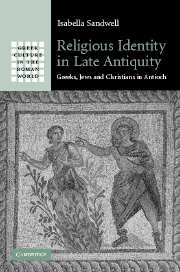Book contents
- Frontmatter
- Contents
- Preface
- List of abbreviations
- Part I INTRODUCTION
- Part II CONSTRUCTED AND STRATEGIC RELIGIOUS IDENTITIES AND ALLEGIANCES
- Part III RELIGIOUS IDENTITIES AND OTHER FORMS OF SOCIAL IDENTIFICATION
- Part IV RELIGIOUS IDENTITY AND SOCIAL ORGANIZATION
- Chapter 7 Chrysostom and social structure among Christians in Antioch
- Chapter 8 Libanius, religious allegiance and social structure
- Part V ASSESSING THE IMPACT OF CONSTRUCTIONS OF IDENTITY
- Bibliography
- Index
Chapter 8 - Libanius, religious allegiance and social structure
Published online by Cambridge University Press: 22 September 2009
- Frontmatter
- Contents
- Preface
- List of abbreviations
- Part I INTRODUCTION
- Part II CONSTRUCTED AND STRATEGIC RELIGIOUS IDENTITIES AND ALLEGIANCES
- Part III RELIGIOUS IDENTITIES AND OTHER FORMS OF SOCIAL IDENTIFICATION
- Part IV RELIGIOUS IDENTITY AND SOCIAL ORGANIZATION
- Chapter 7 Chrysostom and social structure among Christians in Antioch
- Chapter 8 Libanius, religious allegiance and social structure
- Part V ASSESSING THE IMPACT OF CONSTRUCTIONS OF IDENTITY
- Bibliography
- Index
Summary
LIBANIUS' WRITINGS AND ‘PAGAN PARTY’ FOCUSED ON JULIAN
Paul Petit has argued that Libanius' writings reveal to us a ‘confrérie’ or ‘société’ based on religious allegiance in Antioch: ‘le parti Païen’. He suggests that various references in Libanius to ‘good men (agathoi)’, ‘companions (hetairoi)’ (F.1433) and ‘literary clubs (syllogoi)’ (Or. 14.42 (F.ⅱ.102)) enable us to construct a picture of a literary-religious group meeting under Constantius to recruit new followers and prepare for Julian to come to power. Petit continues to track the existence of such a ‘pagan party’ after the accession of Julian, as it gained favour from imperial power. He lists six people who formed a gang or ‘brains trust’ around the emperor Julian: Maximus of Ephesus, Priscus 5, Himerius, Oribasus, Secundius Salutius and Anatolius 5/4. After the death of Julian, Petit sees this party as continuing to exist into the reign of Valens and Valentinian, but only in ‘semi-secrecy’ and ‘remembrance of past activities’. The idea of the ‘pagan party’ was revisited more recently by Malosse, who suggests that we can identify certain friends and old students of Libanius as its members. Malosse's list includes Entrechius, Helpidius 6, Seleucus 1, Fortunatianus and Celsus, as well as Ablabius, otherwise unknown (Ep. F.493). The focus for Malosse's pagan party, as for Petit's, is the emperor Julian. Malosse refers to the fact that in 353 Entrechius was looking forward to seeing the emperor in Bithynia (Ep. B.23 (F.493). The focus for Malosse's pagan party, as for Petit's, is the emperor Julian.
- Type
- Chapter
- Information
- Religious Identity in Late AntiquityGreeks, Jews and Christians in Antioch, pp. 213 - 240Publisher: Cambridge University PressPrint publication year: 2007



